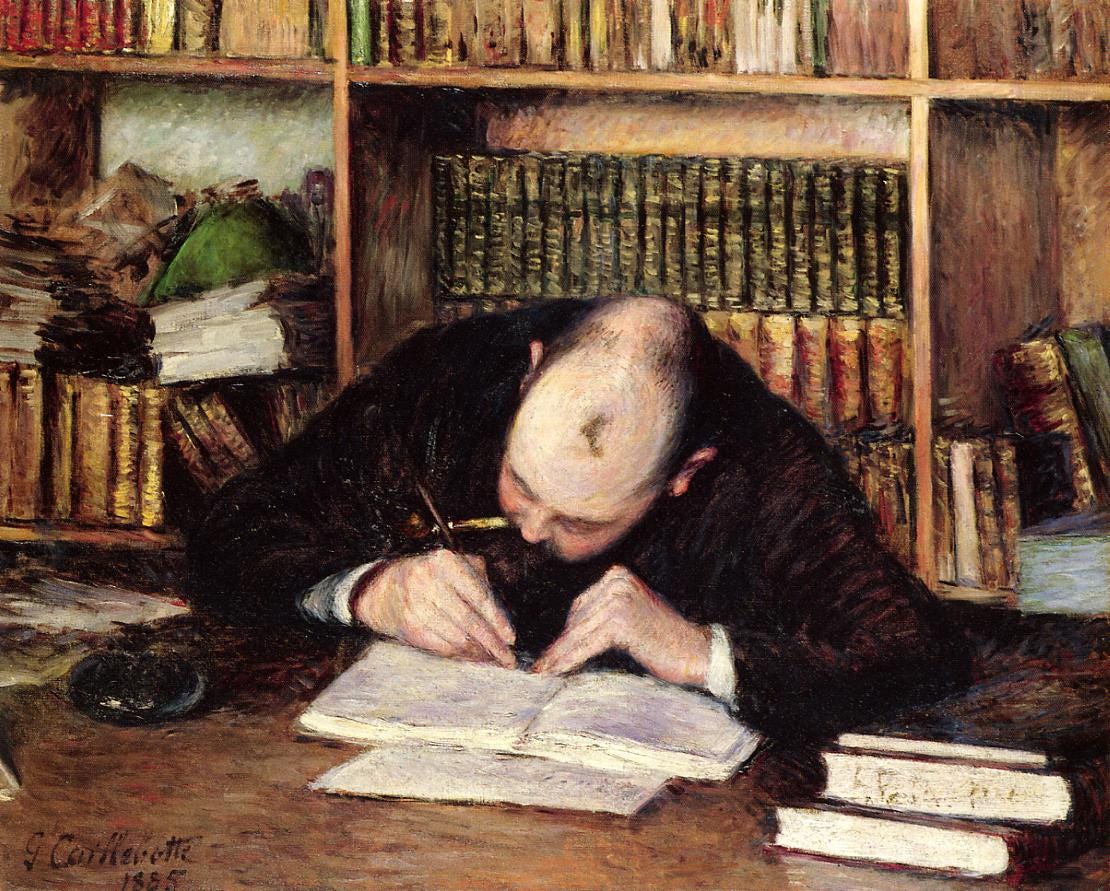Read-along – The Counterfeiters (3 of 6)
Part Two, Chapters 1-7 – and Edouard's Theory of the Novel
Dear Counterfeiters,
We’ve read Part Two of The Counterfeiters – what are your thoughts? Please do share yours in a comment below. Here are my impressions:
In Part Two, Chapter Three – at the very centre of this, Gide’s only ‘novel’ – the novelist Edouard expounds his ‘Theory of the Novel’.
Here are his key points:
1.
The novel, of all literary genres, is the freest, the most lawless . . . Is it for that very reason, for fear of that very liberty . . . that the novel has always clung to reality with such timidity?
2.
By localizing and specifying one restricts. It is true that there is no psychological truth unless it be particular; but on the other hand there is no art unless it be general. The whole problem lies just in that – how to express the general by the particular – how to make the particular express the general.
3.
I should like a novel which should be at the same time as true and as far from reality, as particular and at the same time as general, as human and as fictitious as Athalie, or Tartuffe or Cinna.
4.
In order to arrive at this effect . . . I invent the character of a novelist, whom I make my central figure; and the subject of the book, if you must have one, is just that very struggle between what reality offers him and what he himself desires to make of it.
5.
My novel hasn’t got a subject. . . . Let’s say, if you prefer it, it hasn’t got one subject. . . . I should like to put everything into my novel. I don’t want any cut of the scissors to limit its substance at one point rather than at another. For more than a year now that I have been working at it, nothing happens to me that I don’t put into it – everything I see, everything I know, everything that other people’s lives and my own teach me.
6.
Day by day in a notebook, I note the state of the novel in my mind . . . My notebook contains, as it were, a running criticism of my novel – or rather of the novel in general. . . . If I don’t succeed in writing the book, it’ll be because the history of the book will have interested me more than the book itself – and taken the book’s place; and it’ll be a very good thing.
7.
I am beginning to catch sight of what I might call the ‘deep-lying subject’ of my book. It is – it will be – no doubt, the rivalry between the real world and the representation of it which we make to ourselves.
And before we leave Part Two, here’s a little more about Saas-Fée, which is a small Alpine village in southern Switzerland.
Today it’s best known as a ski resort . . .
. . . and for being the location of the music video for ‘Last Christmas’ by Wham!
This week we’re reading Part Three, Chapters 1-6. I look forward to discussing with you next Friday 30th.
Here are links to our previous The Counterfeiters posts:
The Schedule (11 April)
André Gide (21 April)
0. Le Jardin du Luxembourg (2 May)
2. Part One, Chapters 10-18 – and Cocteau’s reviews (16 May)
And if you’re not reading The Counterfeiters with us, remember you can choose to opt out of our conversation. Just follow this link to your settings and, under Notifications, slide the toggle next to ‘The Counterfeiters’. A grey toggle means you will not receive emails relating to this title.









I keep thinking back to a professor I had in college who off-handedly commented, rather disparagingly, that unlike poetry and drama the novel has no form. Evidently he agrees with Eouard. These chapters are a fascinating blend of literary theory, alarming psychological speculation and soap opera. (What is “wrong” (!) with Boris?) I was struck by Bernard being struck by how his crush is going back to her husband, creating the same kind of parental relationship that he fled. Also for a while Boris was carrying around what amounted to a mezuzah, which seems to be lost. It might be interesting to think about how this ancient practice relates to the discussions of Catholic and Protestant faith already encountered at the school.
I liked the use of the counterfeit coin to explain how we show up in life. Gide is posturing here as you note Henry, and this quote that Bernard says while talking to Laura fits well - “one wants to deceive people and one is so much occupied with seeming, that one ends by not knowing what one really is” there is a repeated theme here of the young falling in love with the slightly older generation and a fair bit of woman bashing. Says a lot about Gide.